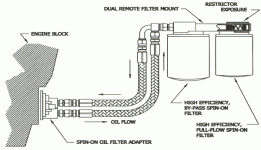I use a bypass on my semi truck, but I haven't considered doing it to my other stuff. Even my Diesel Jeep Liberty, I do no use one. I can do a lot of oil changes on small equipment for the cost of a bypass unit. For an engine with a lot of oil in the sump, it can be more cost effective to put on bypass and extend oil drains. My Detroit holds 38 quarts in filters and sump. I normally take oil changes out to 25,000 miles, but am considering upping to 30,000 miles. That would keep me in the 4 oil changes a year ballpark. The Diesel in the Jeep, we just reprogrammed the ECM and knocked out the EGR so that the oil stays pretty clean and we take it to 11,000 miles not using bypass.
And that was the purpose of CJ-4 specification for diesel engine oils... to help keep particulates in suspension and not binding together. Many commercial trucks have all this emissions stuff and are not using bypass and not experiencing major problems. And since it is not uncommon for these engines to put on 2600 engine hours a year, they should be able to tell something by now.
Detroit, with their DD15 engine, has a 50,000 mile oil change recommendation NOT using bypass! It all depends on the OEM. There is not a diesel pickup, or gasoline engine made that cannot easily go to 500-7000 miles between oil changes with no worries. Unless one is just wanting to experiment on how long they can take oil drains, it really is not very cost effective to do it on smaller engines. Heavy equipment, Large commercial trucks, etc, sure. Either way, if you are going to extend the drains on anything, you also need to run regular oil samples to watch oil condition. That adds cost also. So in the end, you may end up still spending what you do now and have gained nothing except maybe bragging rights about how long you take your oil out to.
